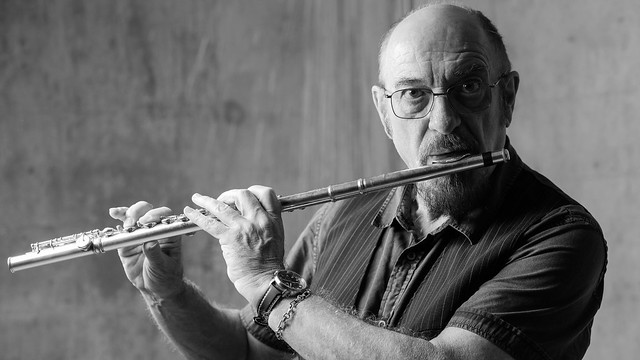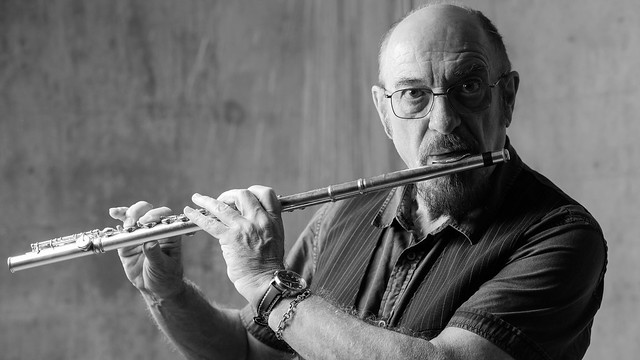
Ian Anderson of Jethro Tull (Photo by Travis Latam)
Famed progressive rock band Jethro Tull released This Was, their first studio album, in 1968, and founder Ian Anderson last year began a series of concerts to commemorate the band’s 50th anniversary. The Jethro Tull 50th Anniversary show arrives at MGM National Harbor on Monday, March 11. We’re looking forward to hearing early favorites like “Aqualung,” “Thick as a Brick,” and “A Song for Jeffrey,” among others.
Parklife DC had the distinct honor of chatting with Ian about what to expect during the Jethro Tull show, how his personal experiences with the flute have evolved, and what it’s like to be a witness to key historical events and even a catalyst for cultural change.
Mickey McCarter: We’re looking forward to seeing you at MGM National Harbor! What can we expect from the show?
Ian Anderson: It is a nostalgic look at the first 10 years, for the most part, of Jethro Tull’s early career, when we were getting a reputation, traveling around the world, and becoming an internationally successful rock band.
And it focuses on those first 10 years, with a look at the early material, the keynote songs from the full albums. On the big video screen behind me, we feature some special guests who pop up to introduce songs and say hello to the audience.
I’m not really a nostalgic person. But in this case, I decided after working on the video and the setlist, that it was going be a lot of fun, so that’s what I did. We started touring this April last year, and we’re touring on and off during the course of this year too, although some of our concerts have been more generic than others. This one will be special.
MM: You’re no stranger to DC! You’ve performed in our area before, so I’m curious if there’s anything that you enjoy, either professionally or personally, about coming to our area.
IA: I have played in Wolf Trap in Vienna several times over the years, and it’s always one of the more enjoyable shows. I’ve stayed in Washington a few times, I’ve visited The White House as a guest of a friend of ours, sadly deceased, Tony Snow, who was the press secretary for George Bush. It was very entertaining to spend some time with him in his office and at a press briefing and to get to see the inner workings. Back then, the briefings were polite, successful, and understood and appreciated by the media, whereas these days, press briefings at the White House are not what they used to be.
Stream 50 for 50 by Jethro Tull on Spotify:
MM: I can appreciate that.
Can you tell us a little bit about your relationship with the flute, your instrument? Has your method for approaching it, and your preference in brands, changed any over the years?
IA: I began with a student model flute that was worth about probably $50 at the time. In the ‘80s, I progressed to a slightly better quality flute and then in the ‘90s to a more professional flute. At the beginning, it didn’t seem worth it because I broke so many. It’s hardly worth spending a lot of money on something that falls to pieces.
But I started to look after my flutes a little more carefully and clean them every night, and they didn’t break any more. So these days, I play professional quality flutes, for the most part, those are made in the USA, either by the company Powell Flutes in Boston or perhaps Nagahara Flutes, also in the Boston area. These days I’m more of a serious flute player than I was when I began.
It’s something I continue to work on, and I’m trying to get a little more out of the instrument to extend its range and its nuances, when I have to play other kinds of music. In fact in the next couple of days, I have to do some Celtic orchestral music for one other artist and some English folk music for another artist. So, I shall be oscillating between Irish-Celtic music and English folk music, which in some ways is not so dissimilar. But at the same time of course, I have to play rock music and blues and jazzy stuff as well. So, it’s good to be able to extend my set of influences.
Watch Jethro Tull performing Aqualung for Rockpop in Concert on Oct. 7, 1982:
MM: You have supported a number of charitable causes over the years, including Oak and Furrows, Population Matters, and the Polyphony Foundation. And have you been active with those or other causes recently and, if so, do you have any stories about being involved?
IA: Well, I pick and choose charities from time to time. It doesn’t necessarily mean I continue to support them for the rest of my life, but I do support a number of charities for the homeless, and a number of charities involved in wildlife conservation, and each year I do a number of fundraising concerts for great Medieval cathedrals in the United Kingdom, as well as some other churches in Germany. Last year, I supported a couple of churches in Italy. It’s something I do that’s directly with the church. We raise money for their repairs and maintenance and upkeep. It costs a lot of money to run a big old cathedral. The running costs can be anything from 5,000 to 15,000 pounds per day. So it’s all paid for out of donations and public subscription. There’s no state benefit going to the churches.
MM: That’s terrific. How interesting. Looking ahead, I know you’re working on a new album, but do you have any future plans or unfulfilled ambitions?
IA: Well, there are a few projects that I’m working on at the moment — one of which is to do with a book that’s coming out shortly — a book about Jethro Tull — which is going to come out later this year. I’m just working on the first draft at the moment with the writer. I’m working on some songs that will be released late this year or early next year as a new album. And I have another couple of projects as well – they are both recording projects and an illustrated book of my collective lyrics over the past 51 years.
MM: Taking a look back, is there anything that stands out in your memories of the past 50 years that you find particularly memorable – particularly when it comes to performing?
IA: Yes, there are lots of things that I’ve done over the years, places that I’ve played memorably — places like Ephesus, the ancient Roman amphitheater in Turkey, where Saint Paul famously preached shortly after the time of Christ and various other ancient amphitheaters, Greek and Roman amphitheaters around the Mediterranean. They were very memorable places to play. But, of course, places like The Fillmore East in New York City or the Royal Albert Hall in London, those are places that you remember as being special. I’ve been fortunate to play many times in these places, not just once but usually quite a few times. So when I go back to the Albert Hall, it always has some sort of special attraction. I first played there in 1969, last played there last year, and many times in between.
I don’t necessarily remember individual performances, in terms of actual musical performances, unless something bad happened. We’ve had a couple of tragedies in Canada for example. There were a number of major riots with tear gas and police fighting and bad things in Milan and Rome in the ‘70s. I tend to remember the bad things rather than … You know, they’re the things that stick in your mind, where you feel partly responsible for the misfortunes that affect people who come to your concert. You feel a little bit responsible for that. It’s always a tricky, difficult moment, really.
Watch a preview for Making of Thick as a Brick 2, taken from the special edition Thick as a Brick 2 DVD:
MM: What you’re saying reminds me of how I feel about having to separate art from your environment a bit. You can always enjoy music from an artistic perspective but you cannot always control the circumstances under which you’re listening to it.
IA: Over the years, we, along with other bands of our era, played an important part (I think) in bringing about changes — reflecting changes in culture, politics, environment, social freedoms and also in encouraging them. So, for example, Russia in the ‘80s was beginning to gradually open up to Western culture under Mr. Gorbachev and in the period of Perestroika and Glasnost. Things began to change, and it was accepted that British rock bands were maybe not the evil that they’d been portrayed under his predecessors.
In fact, in 1987, Jethro Tull and the Beatles were the first Western bands to be officially released on the Russian state record label, Melodiya Records. That brought home to me the fact that we were part of a changing environment, where music culture and other forms of Western culture were beginning to be accepted in countries that had been extremely frightened of the effects that they thought that might have – not just, obviously, Russia, but other countries — from the Latin American countries to India. Even in India, things weren’t too hospitable to Western acts going traveling there, at least for Western rock bands, really until the end of the ‘80s, beginning of the ‘90s. Then they began to loosen up as well.
And during the ‘70s, you had Francoist Spain, where with a little trepidation, you went to perform knowing that it was an extremely right-wing government. If somebody didn’t take a liking to you, you might be spending the night or longer in jail. You had to be pretty careful with whom you mixed with or what you said.
MM: Right.
IA: But, things may be not so different today. That’s why I’m very careful never to badmouth the American administration because I have a US visa I need to protect, not only for myself but for the rest of the band and crew. So, if you try to draw out of me my scathing criticisms, then I’m afraid I will remain relatively silent.
MM: Well, thank you so much for your time, sir — we sure appreciate it, and we’re looking forward to seeing the show at MGM National Harbor!
IA: Yeah, it should be a lot of fun. Hope to see you there.
**
Ian Anderson Presents Jethro Tull: 50th Anniversary Tour
MGM National Harbor
Monday, March 11
Show @ 8pm
$35-$99.50
All ages







Terrific interview. Nicely done!
Good Stuff!